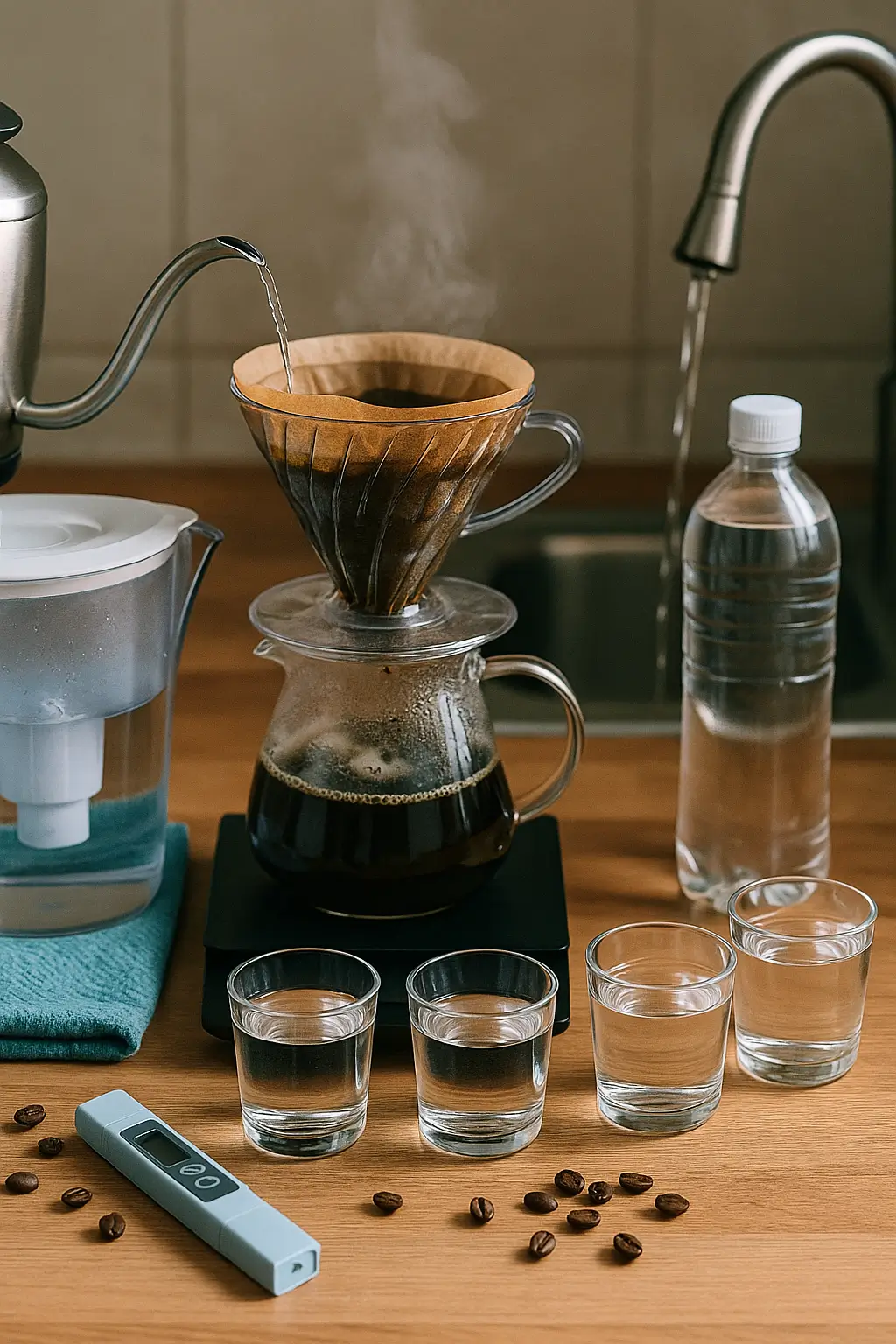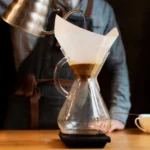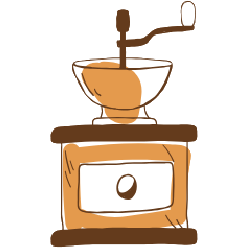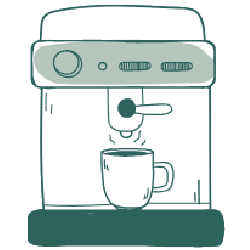You probably spend a lot of time thinking about your coffee beans or that fancy brewing machine. But what about the one ingredient that makes up over 98% of your cup? I’m talking about water. The quality of your water drastically changes the flavor, how well the coffee extracts, and even how long your machine lasts. To get truly great coffee, you need to understand a few things about water, like its mineral content—things like Total Dissolved Solids, hardness, and alkalinity—and its pH level. Let’s break down these factors and help you find your ideal coffee water, making your daily brew amazing.
- Why water quality matters so much for your coffee
- Understanding the ideal coffee water: What does the SCA recommend?
- Different water types: What are the pros & cons for your coffee?
- Making your tap water excellent for brewing: How to get the best coffee water
- Water for specific brewing methods: What works best depending on how I brew?
- Why your water is the quiet star of your coffee cup
Why water quality matters so much for your coffee
What’s the science behind coffee extraction, and how do minerals and pH play a role?
Coffee extraction is really a chemical dance. Hot water pulls different flavor compounds from your roasted coffee grounds. The minerals already dissolved in your water act like little helpers, directing exactly which compounds come out and how fast. Think of Total Dissolved Solids (TDS) as a general score for all those dissolved minerals.
Specifically, water’s hardness, mainly from calcium and magnesium ions, really impacts how your coffee’s acids behave. Then there’s alkalinity, or carbonate hardness, which helps buffer those acids. Getting the water’s pH level right is also important because it neutralizes the coffee’s natural acidity. This keeps your cup from tasting too sour or too bitter.
How does your water affect the coffee’s flavor?
Your water directly shapes your coffee’s final flavor profile. It controls which compounds are extracted from the grounds. Different minerals and water characteristics can really change your tasting experience.
- Calcium: This mineral often brings out heavier, sweeter notes, giving your coffee a rounder body.
- Magnesium: On the other hand, magnesium helps extract brighter, more acidic flavors.
- High Hardness: Too much hardness in your water can lead to over-extraction. This can make your coffee taste bitter, chalky, or just flat.
- Soft Water (Low Hardness): If your water is too soft, you might get under-extraction. This leaves you with a weak, thin, and lifeless flavor.
- Alkalinity: This acts as a buffer for your coffee’s acids, controlling how acidic or bright your coffee tastes. If alkalinity is too high, it mutes the brightness, making the coffee taste dull. If it’s too low, your coffee can end up unpleasantly sour.
- pH: A balanced pH, usually slightly alkaline in your brewing water, reduces the coffee’s natural acidity. This keeps your cup from being too sour without losing its pleasant brightness.
- Chlorine: Even tiny amounts of chlorine cause nasty off-flavors. People often describe these as medicinal or chemical.
How does your water protect your brewing equipment?
The right water also protects your expensive coffee machines and makes them last longer. High mineral content, especially calcium and magnesium found in hard water, is the main reason for scale buildup. This limescale can really mess up your espresso machines, drip brewers, and kettles. It makes them less efficient and can lead to expensive repairs down the line.
But watch out—super pure water, like distilled water, isn’t good for your equipment either. This kind of water can actually pull important minerals right out of your machine’s metal parts, potentially causing corrosion over time. So, finding the perfect water means balancing great flavor with keeping your machines safe.
Understanding the ideal coffee water: What does the SCA recommend?
What does the Specialty Coffee Association (SCA) suggest for coffee water?
The Specialty Coffee Association (SCA) really sets the standard for coffee water. Their guidelines help baristas and home brewers get the best possible extraction and flavor. The SCA gives us target values and acceptable ranges for several important water parameters. These are crucial for brewing an amazing cup.
Here’s a quick look at the SCA’s suggested water parameters:
| Parameter | SCA Target Value | SCA Acceptable Range |
|---|---|---|
| Total Dissolved Solids (TDS) | ~150 mg/L | 75–250 mg/L (ppm) |
| Calcium Hardness | 4 grains (~68 mg/L as CaCO3) | 1–5 grains (17–85 mg/L as CaCO3) |
| Total Alkalinity | ~40 mg/L (as CaCO3) | Near 40 mg/L |
| pH | 7.0 | 6.5–7.5 (up to 8.0) |
| Sodium | ~10 mg/L | Near 10 mg/L |
| Chlorine | 0 mg/L | 0 mg/L |
Following these guidelines helps you get that ideal coffee water, making sure your coffee tastes great and stays consistent, no matter how you brew.
How do these water parameters affect your coffee?
To brew your best coffee, you need to understand each water parameter. Every factor plays a unique role in how your coffee tastes and how your equipment performs.
What’s the right Total Dissolved Solids (TDS) for your coffee water?
Total Dissolved Solids (TDS) measures all the inorganic and organic stuff dissolved in your water. The SCA aims for about 150 ppm (mg/L) of dissolved minerals. Most people find a sweet spot for TDS between 100–150 ppm.
If your water has too little TDS, your coffee might be under-extracted, tasting weak and flat. But if the TDS is too high, you risk over-extraction, which can bring out bitterness and odd flavors, or even clash with delicate notes in your coffee. Keeping your TDS in the recommended range is how you get a balanced, flavorful cup.
What’s the ideal water hardness (calcium & magnesium) for your coffee?
Water hardness mostly comes from calcium and magnesium ions. These minerals really affect how your coffee extracts and how its flavors develop.
Calcium usually brings out sweeter, fuller body notes, while magnesium helps extract more acidic and brighter flavors. SCA water standards suggest calcium hardness around 68 mg/L. Some experts even recommend a 2:1 magnesium to calcium ratio for the best balance. Water that’s too hard causes a lot of scale buildup and makes coffee taste over-extracted and chalky. On the other hand, water that’s too soft leads to under-extracted coffee that’s weak and flat.
How does alkalinity (buffering capacity) affect your coffee water?
Alkalinity acts as an important buffer against the natural acidity in coffee. The SCA suggests about 40 mg/L of total alkalinity for the best taste.
The right alkalinity lets those nice coffee acids come through without making your cup taste too sour or sharp. If alkalinity is too high, it over-buffers the acids, flattening the coffee’s flavor and dulling its brightness. Too little alkalinity means not enough buffering, which can make your coffee taste unpleasantly tart or sour from unchecked acidity.
What pH level works best for coffee brewing?
The pH scale tells us how acidic or alkaline something is; 7.0 is neutral. For brewing coffee, a slightly alkaline pH, usually between 6.5 and 7.5 (sometimes up to 8.0), really helps. This range balances the coffee’s natural acidity, which typically sits around pH 5–6.
A balanced pH stops your coffee from tasting too sour or sharp. It lets its pleasant brightness and subtle flavors truly emerge. This controlled acidity makes for a much more enjoyable and well-rounded cup.
Why is the chlorine factor so important for your coffee water?
Chlorine in your brewing water is terrible for coffee flavor. Even small amounts of chlorine can react with coffee compounds, creating strong, unpleasant chemical or medicinal off-flavors.
That’s why SCA water standards specifically say 0 mg/L of chlorine for coffee water. Making sure there’s no chlorine at all is a basic step to getting the best water for coffee and truly experiencing its taste.
Different water types: What are the pros & cons for your coffee?
Is filtered tap water the best for your coffee?
For most home brewers, filtered tap water is often the most practical and recommended way to get good coffee water. It offers several benefits for everyday use.
- Advantages: Filtration removes unwanted stuff like chlorine, chloramines, and sediments, making the water taste much better. Importantly, many filters keep those good minerals like calcium and magnesium, which are vital for proper coffee extraction. This method is generally safe for your brewing equipment and gives you a cleaner, more consistent base for your brew.
- Disadvantages: How well filtered tap water works depends on the filter. Simple carbon filters might not remove all the hard water minerals. Plus, the final mineral content still changes a lot based on your local tap water source. This means you might need to make more adjustments for really precise brewing.
Is distilled water the best for your coffee?
Distilled water is super pure; it’s processed to remove almost all minerals and impurities. While it gives you consistency, it’s generally not the best choice for coffee when used by itself.
- Advantages: Its purity means absolutely no scale will build up in your coffee brewing equipment. Distilled water gives you a consistent, blank slate. It’s great if you want to add minerals back in yourself, giving you full control over your water’s profile.
- Disadvantages: Distilled water completely lacks the essential minerals needed for proper coffee extraction. This leads to a weak, flat, or even sour/bitter (over-extracted) cup. Its extreme purity can also pull minerals out of your equipment’s metal parts, potentially causing corrosion over time. So, avoid using distilled water alone for brewing coffee.
Is bottled water the best for your coffee?
Bottled water can seem easy, but it often gives inconsistent results for coffee. Not all bottled waters have the same mineral profiles.
- Advantages: Some bottled waters, especially natural spring waters, can have a balanced mineral content that works well for brewing. They also don’t have local tap water impurities like chlorine.
- Disadvantages: The mineral content, including Total Dissolved Solids (TDS), varies a lot by brand and source. You’ll need to check labels carefully to find a good option. Bottled water also costs more and creates more waste, making it less sustainable long-term.
Is Reverse Osmosis (RO) water the best for your coffee?
Reverse Osmosis (RO) water offers a fantastic starting point if you want total control over your brewing water. An RO system removes 95–97% of dissolved solids from water.
However, like distilled water, RO water is often too pure on its own for good coffee extraction. You’ll need to precisely add beneficial minerals back in with specific additives to meet those strict SCA water standards for coffee. This process lets you create a highly customized and perfect water profile.
Making your tap water excellent for brewing: How to get the best coffee water
How can simple filtration help you get the best coffee water?
Simple filtration, mainly using activated carbon filters, is an easy first step to improving your coffee water. These filters do a good job of removing common unwanted elements from tap water. You find activated carbon filters in pitcher filters, faucet filters, and refrigerator filters. They’re great at getting rid of chlorine, chloramines, and other things that can spoil your water’s taste. This basic, yet important, step really boosts your tap water quality for coffee, giving you a cleaner, nicer-tasting brew.
What advanced home systems provide the best coffee water?
For serious coffee lovers chasing the absolute best water, several advanced home systems give you much more control. These multi-stage solutions manage your water chemistry better than basic filters.
- Multi-stage filtration systems: These systems combine different filter types, like carbon, ion exchange, and sediment filters. They work together to manage water hardness and alkalinity more effectively, while also removing a wider range of contaminants.
- RO systems with remineralization: Reverse Osmosis (RO) systems give you a very pure base by removing most dissolved solids. The great thing is, you can then precisely put beneficial minerals back in. This lets you meet SCA water standards or create your own preferred coffee water profiles for amazing brewing control.
How do specialized mineral additives create the best coffee water?
Specialized mineral additives offer a very precise way to create the best coffee water. Products like Third-Wave Water packets are made just for this. These additives let you put exact mineral blends into pure water, like distilled or RO water. They’re designed to achieve specific coffee water profiles, giving you complete control over things like hardness and alkalinity. This level of customization ensures your water perfectly matches your chosen coffee beans.
Why is testing your water important for the best coffee water?
Testing your water is an absolutely vital step in finding the best coffee water. You can’t improve your water effectively if you don’t know what’s in it to begin with. Understanding your current tap water profile is fundamental to deciding how to make it better.
You can use simple at-home test strips, often sold for aquariums, to check basic things like pH, water hardness, and alkalinity. For a more detailed look, professional water testing services can give you a full breakdown of your water’s chemistry. Knowing these results will help you choose the right filtration or remineralization method to get your ideal brewing water.
Water for specific brewing methods: What works best depending on how I brew?
What are the main differences between espresso water and drip/pour-over water for great coffee?
While the general ideas for choosing the best coffee water stay pretty consistent, different brewing methods have their own specific needs. High-pressure espresso extraction has noticeably different demands than gentler drip or pour-over methods.
Espresso water needs more tightly controlled mineral content. We’re talking Total Dissolved Solids (TDS) between 90–150 ppm, alkalinity of 40–70 ppm, and a pH between 6.5–8.0. This exact balance is important to stop scale buildup in sensitive espresso machines and to ensure an ideal, balanced extraction under high pressure. For drip and pour-over methods, the water generally benefits from simply being filtered and having a neutral pH. While mineral content should still match SCA water standards for taste and machine health, it doesn’t need to be as strictly controlled as for espresso, where concentration is everything.
| Aspect | Espresso Water | Drip/Pour-over Water |
|---|---|---|
| TDS (Total Dissolved Solids) | 90-150 ppm ideal for taste & machine function | Generally filtered/neutral; no strict TDS range needed |
| Alkalinity | 40-70 ppm to buffer acidity without muting flavor | Not specifically controlled, but filtered water preferred |
| pH | Between 6.5 and 8.0 to stabilize extraction | Neutral pH to preserve natural coffee acidity and flavor |
| Mineral Impact | Balanced minerals protect machine & influence flavor | Mineral content less critical, mainly for taste & equipment upkeep |
Why your water is the quiet star of your coffee cup
Ultimately, water quality is the true, often overlooked star behind a really good cup of coffee. It heavily influences not just the subtle flavors you taste, but also the long-term health and efficiency of your brewing equipment. Taking the time to understand and fine-tune your water can totally change your coffee experience.
By paying attention to things like mineral content, pH level, and making sure there are no impurities, you’ll really unlock the full potential of your favorite coffee beans. I encourage you to play around with different water profiles. Find what you think is the best water for coffee that perfectly suits your taste and brewing method. Ready to taste the difference? Start by testing your water today, or explore some filtration solutions to help your coffee shine!









